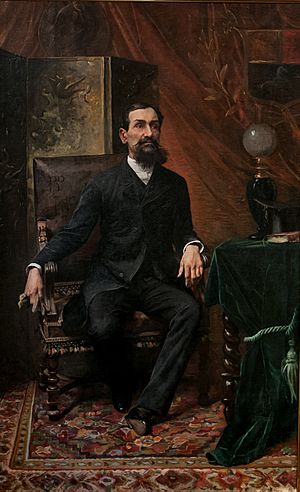Juan Pablo Rojas Paúl facts for kids
Quick facts for kids
Juan Pablo Rojas
|
|
|---|---|
 |
|
| President of Venezuela | |
| In office 2 July 1888 – 19 March 1890 |
|
| Preceded by | Hermógenes López |
| Succeeded by | Raimundo Andueza Palacio |
| Minister of Foreign Affairs of Venezuela | |
| In office 26 January 1855 – 7 February 1855 |
|
| President | Joaquín Herrera |
| In office 24 February 1869 – 31 July 1869 |
|
| President | José Ruperto Monagas |
| In office 6 December 1869 – 27 January 1870 |
|
| President | José Ruperto Monagas |
| Minister of Finance of Venezuela | |
| In office 1879–1884 |
|
| Preceded by | Diego Jugo Ramírez |
| Succeeded by | Francisco Rivas Castillo |
| In office 1887–1887 |
|
| Preceded by | Fulgencio M. Carias |
| Succeeded by | Pedro Ramos |
| In office 1899–1899 |
|
| Preceded by | Santos Escobar |
| Succeeded by | Ramón Tello Mendoza |
| Personal details | |
| Born | 26 November 1826 Caracas, Gran Colombia |
| Died | 22 July 1905 (aged 78) Caracas, United States of Venezuela |
| Political party | Liberal Party |
| Spouse | Josefa de la Concepción Báez |
| Signature | |
Juan Pablo Rojas Paúl (born November 26, 1826 – died July 22, 1905) was an important Venezuelan leader. He served as the President of Venezuela from 1888 to 1890. He was special because he was the first civilian president chosen by proper constitutional rules in 50 years. He was also the only one to finish his full term for a long time.
Contents
Early Life and Career
Juan Pablo Rojas Paúl was born in Caracas, which was then part of Gran Colombia. He grew up to become a lawyer and politician. Before becoming president, he held several important jobs. He was the Minister of Finance (like a country's treasurer) from 1879 to 1884, and again in 1887. He also served as the Minister of Foreign Affairs several times.
Becoming President of Venezuela
Rojas Paúl became president after Hermógenes López finished his time as an interim (temporary) leader. This happened after Antonio Guzmán Blanco, who had been president three times, finally stepped down.
When Rojas Paúl took office, there was a lot of tension in Venezuela. Two powerful political groups, one led by Guzmán Blanco and another by Joaquín Crespo, were in conflict. Rojas Paúl tried to bring these groups together and make peace.
Challenges During His Presidency
During his time as president, there were many protests against Guzmán Blanco. These protests happened in the capital city and other parts of Venezuela. These events caused a big disagreement between Rojas Paúl and Guzmán Blanco. Guzmán Blanco was trying to control Venezuela from Paris, France, but Rojas Paúl wanted to lead the country himself.
Rojas Paúl also had to deal with an uprising led by Joaquín Crespo. After the rebellion was stopped, Crespo had to leave the country and live in exile.
Key Achievements as President
Rojas Paúl's presidency lasted for two years, and it was a time of good economic growth for Venezuela. He used this money to improve the country.
- Supporting Education and Religion: He allowed the creation of new science departments in universities. He also brought French nuns to Venezuela and helped build and fix many religious buildings. This was a change from Guzmán Blanco's policies, who had been against the church.
- New Schools and Connections: He opened national schools in cities like Maracaibo and Barquisimeto. He also opened a new submarine cable that connected La Guaira (a Venezuelan port) to the Antilles islands and Europe. This made communication much faster.
- Art and History: He opened an art exhibit by the famous painter Martín Tovar y Tovar at the National Capitol. In 1888, he founded the National History Academy, which helps preserve Venezuela's history.
- Important Publications: During his term, a very important book was published. It was called Great geographical, historical and statistics compilation of Venezuela, written by General Manuel Landaeta Rosales.
Later Life and Legacy
After his time as president, Juan Pablo Rojas Paúl continued to be involved in public service. He served again as the Minister of Finance in 1899.
He passed away in Caracas in 1905, at the age of 78. He is remembered for being a civilian leader who worked to unite Venezuela and improve its infrastructure and education.
Personal Life
Juan Pablo Rojas Paúl was married to María Josefa de la Concepción Báez. She was the First Lady of Venezuela during his presidency, from 1888 to 1890.
Images for kids
See also
 In Spanish: Juan Pablo Rojas Paúl para niños
In Spanish: Juan Pablo Rojas Paúl para niños
 | James Van Der Zee |
 | Alma Thomas |
 | Ellis Wilson |
 | Margaret Taylor-Burroughs |


